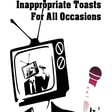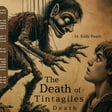Become a Creator today!Start creating today - Share your story with the world!
Start for free
00:00:00
00:00:01

Guest: Gena Radcliffe: Author and 'Kill by Kill' Host.
Kill by Kill Podcaster and writer, Gena Radcliffe discusses media depictions of mental illness in her upcoming book. Wednes and Gena also talk about old-school electroshock therapy, the Russian takeover of Livejournal, therapy and "Safety Contracts," and why Wednes adores Jeffrey DeMunn. Also 'Salem's Lot, Rob Zombie movies, and why the customer has never been "always right."
Transcript
Introduction to The Mentally Oddcast
00:00:02
Speaker
You are listening to The Mentally Oddcast, brought to you by sometimes hilarious horror magazine.
Purpose of the Podcast: Mental Health and Creativity
00:00:09
Speaker
Each week, your host, Wednesdayly Friday, will be talking with creators from many disciplines who live with mental illness, addiction, neurodivergence, and the impact of trauma. We'll discuss how their mental, physical, and emotional health impacts their creative goals, processes, and the things that they create.
Meet the Host: Wednesdayly Friday
00:00:30
Speaker
We hope we can assure all of you who live with these things that you are not alone and you can make art about it.
Guest Introduction: Gina Radcliffe
00:00:38
Speaker
Art helps.
00:00:45
Speaker
Hi friends, it's me, Wednesday, Lee Friday, and you are listening to the Mentally Oddcast brought to you by sometimes hilarious horror. This week, I am so excited. We are talking to Gina Radcliffe, who is the co-host of the Kill by Kill podcast.
00:01:01
Speaker
She is a writer and the film editor at The Spool. If you know her newsletter, Gina watches things. It's a sub-stack. It is fantastic. I cannot say enough good things about it.
Online Friendships and Privacy Concerns
00:01:14
Speaker
Gina is also a former contributor to Under the Bed magazine, and she has appeared in the collection Hear Us Scream, The Voices of Horror, as well as performing in the audio book A Spoonful of Murder, which I love because it's a bunch of my stories.
00:01:30
Speaker
Welcome Gina, thank you so much for being here. Thank you. I know you and I have done quite a few projects together actually over the years because we have been online friends since the LiveJournal days. Yeah, it's probably been about 20 years. Yeah, yeah.
00:01:50
Speaker
It's wild and well and you know, it's it actually makes me think about live journal a lot because we're going through this thing with tick-tock right now where people think it's not safe because the Chinese want our information and I'm remembering it was about 15 years ago that Russian oligarchs bought live journal and a bunch of us left because we were just outraged I know I've moved over to dream with for a while for blogging people went a bunch of different places but
00:02:19
Speaker
Yeah, and people had this idea that the Russians were going to pay attention to how Americans talk about politics so that they could interfere in politics. I wonder, do you think that's a thing?
Gina's Journey with Anxiety and Depression
00:02:34
Speaker
Yeah, you're lucky we got all that straightened out. Thank goodness that didn't happen. Who knows what kind of monster they'd put in office.
00:02:44
Speaker
All right now i'm starting to drop a heavy political thing on you right off the bat I did not warn you that I would do that and then just kapow Yeah Why don't we talk a little bit about how it is that you qualify for this show? I know that you um, you do have to deal with depression from time to time Anxiety is another thing that you deal with what what would you like to tell us about that? Uh, I mean it's um, it's honestly it's the particularly anxiety has been something i've been dealing with since I was uh
00:03:12
Speaker
very, very young, I would say about as long as I can remember. I always think of myself as being a kind of very fretful child who had a lot of worries. And of course, like you, I grew up in the era having to worry about the possibility of nuclear war. And so
00:03:35
Speaker
in my home life was not particularly stable, which you also added to the general sense of unease that I felt much of the time. But also I just had a very overactive imagination. So if there wasn't something
00:03:54
Speaker
you real and tangible to worry about. I would just make something up to worry about. So, which is funny because I still do that now many years later.
00:04:06
Speaker
I honestly think a lot of people arguing on the internet is that it's people working out their nervous energy and their anxiety. My life with my parents was tumultuous. It was always stressful. You were always watching your back. Violence, terrible things could just come out of nowhere.
00:04:28
Speaker
Now my life isn't like that because I have this this man that I live with and everything is is chill and nice and I have all this like I'm just not used to it. It feels weird. It feels like being in a
00:04:43
Speaker
the glass case of emotion. Right. You're still waiting for the other shooter drop. Yeah, I get that too. My personal life is given what an over emotional mess I perceive myself to be, my personal life is really, really stable. I don't actually know how that happened. I don't
00:05:07
Speaker
I don't really know how I didn't go through a series of awful relationships and just bouncing from one bad situation to another.
Mental Illness in Media: A Critical View
00:05:19
Speaker
I don't want to use the phrase break the cycle because I don't know if it was even a deliberate choice that I made. It just sort of happened that way and it's one of the things I've always been very fortunate of. Right. I can understand that certainly.
00:05:34
Speaker
You are working on a book, as I understand it, and the subject of the book is portrayals of mental illness in movies and TV. Right. And also books. Are you also doing books? No, that's like, maybe I've kind of touched upon it a little bit, like,
00:05:52
Speaker
Uh, like right now I'm working on the chapter, uh, about specifically about depression. So I wrote a little bit about, um, about Hamlet and things like that. But it's predominantly going to be movies and television. I think if I try to, if I try to rope in books with that, it's, that's going to be way, way too much.
00:06:14
Speaker
Now, I'm sure because it's you, it's going to be fair and even-handed, but I really hope you're going to take some things to task. Oh, absolutely. Absolutely. I have an almost an entire chapter dedicated. I haven't written it yet, but I'm planning to just on
00:06:32
Speaker
uh uh oh my god the name of the movie just slipped out of my head the Jack Nicholson movie where he has OCD um or supposedly has OCD um and and uh just how you know he's just this awful person and everybody just takes his shit because he's got this like mental illness and and and
00:06:52
Speaker
And it's and like he's like racist and he's a homophobe and it's like, okay people with OCD Aren't like that. Why do you keep? attributing this this horrific behavior To you know something where that's not one of the symptoms of it, you know, I mean, it's it's not like he has you know, Tourette's syndrome He's just he's just this old heart. He's this horrible bastard, you know, but everybody just you know Keeps giving him a shot because he's also like a brilliant writer or some nonsense and i'm like no
00:07:23
Speaker
I was sure you were going to say something about Cuckoo's Nest when you brought up Jack Nicholson. Oh, yeah. Well, I have done a whole chapter. Oh, the movie is as good as it gets. Yeah, that's like a love movie. I thought it is. Well, it kind of starts out this weird sort of comedy and then like.
00:07:38
Speaker
Like, you know, he falls for Helen Hunt, and she inexplicably falls for him. And it's just like- Wouldn't she be like 30 years younger than him? Oh sure, but when has that ever stopped anybody? That's the least of his problems. Wow. But yeah, I do go into, I did actually, one chapter I have finished, I do go,
00:08:05
Speaker
into the making of One Floor the Cuckoo's Nest and how it really shook people up because even though by the time it came out
00:08:16
Speaker
We weren't doing the lobotomies and the old-fashioned style of electroshock therapy anymore. The way they were portrayed in the movie was so jarring and haunting that it really changed people's perception of psychiatric hospitals and
00:08:35
Speaker
uh and you know psychiatry in general which was funny because I mean there had been plenty of exposés on psychiatric hospitals you had all the way back to uh Nellie Bly going undercover to to you know to reveal the conditions you know like back in like the end of the 19th century
00:08:58
Speaker
And then you had, uh, there was a life magazine expose in the forties, but it wasn't until you saw the irony is it wasn't until people saw a fictitious portrayal of it. That, you know, either like, Oh, you know, and then you find out, Oh, that's actually based on true events because Ken Kesey wrote the book while he was working in an order as an orderly at a psychiatric hospital. And so much of the way.
00:09:23
Speaker
that electroshock therapy was portrayed in the movie was how it used to be done. It used to be done without the patient's consent. Ostensibly, it was supposed to be therapeutic. It was rarely done therapeutically and without anesthesia. I don't know if you know much about how electroshock therapy is
Personal Experiences with Mental Health and Therapy
00:09:44
Speaker
done now. I mean, they call it electroconvulsive therapy, but
00:09:48
Speaker
Obviously, it's all done with the patient's consent now, and they put you under anesthetic. Carrie Fisher, I think one of her last books wrote a lot about her experiences with her, mostly positively.
00:10:05
Speaker
Yeah, I am aware of that, actually. ECT, like the old-school kind, that's one of the most terrifying things in the world to me. I was actually threatened with it once as a child. Just old-school asylums in general, American Horror Story Season 2,
00:10:22
Speaker
uh you know cuckoo's nest all of that that shit is terrifying to me yeah because it's sort of like you know if you see when you think about your own experiences it's like oh you know if i've been born like 30 years like 30 or 50 years earlier this might have been me
00:10:38
Speaker
Well, yes, um, I have never technically on paper been, uh, you know, impatient psych against my will, but I was once in a situation where I was told that if I did not sign myself in that they would look for someone to sign me in. And, uh, I was pretty confident knowing my family as I do that, sure, they'd sign me in even if they knew I didn't, especially if they knew I didn't want to be there.
00:11:05
Speaker
Yeah, I had to do the 72 hour hold because I told my therapist the time she'd asked me if I could do because I had already made one attempt on my life.
00:11:20
Speaker
And she had asked me for a safety contract, which you had to explain to the listeners. Basically, you're promising your caregiver or your therapist that once you leave their office, you're not going to try to hurt yourself, that basically you're promising to return for the next appointment. And I couldn't do that. She was just like, well, I can't let you leave. And I'm like, oops. I was like, well, I shouldn't have said that. Damn dishonesty.
00:11:49
Speaker
Well, that's the thing that like, no matter how much you may trust your therapist, they do have those. Yeah. Yeah. I mean, if she had let me go, if I'd said no, she let me go anyway, I had hurt myself and she would have, you know, you had to have been accountable for that in some way.
00:12:08
Speaker
And as a patient, then you find yourself walking this line of how honest can I be and still walk out of here. Right. Exactly. And that's where you think about, you know, you know, there must be some little tiny part of me that wants to live. Otherwise I would have lied about it. You know what I mean?
00:12:27
Speaker
But it was weird.
Challenges in Accessing Mental Health Care
00:12:30
Speaker
I actually go into this a little bit in my book where in addition to just being upset about the state of things, now on top of that, I felt bad about letting my therapist down because I really liked her and I was pretty disappointing her.
00:12:50
Speaker
And, you know, and she started talking to me and I just like immediately just, just started crying and I was like, yeah, I can't even, there's not even any point for me to be trying to lie about this. You know what I mean? Like, you know, she, she, she, she knows the deal. She can tell, you know, this is her job. I'm not, you know, I'm not slick enough to try to get anything past this woman. Sure enough. I did not.
00:13:11
Speaker
But the whole idea of like having to be honest and not like someone has to hold you accountable and the people that are going to hold you accountable are the people that you're honest with, which is how therapists find themselves in this. Like, yeah, we're not friends and we're not family, but I am so invested in your health and in your wellbeing and in your, you know, happiness, whatever that turns out to be. It's such a,
00:13:40
Speaker
Bizarre kind of like there are people that I associate with on a business level all the time and even my regular doctor Does not seem quite that invested
00:13:53
Speaker
in that, but that, I mean, that's how, you know, you have a good therapist is that they actually give a shit and they also know you well enough that you can't just sit there and lie to them. Right. Right. Right. Right. Like, um, what's funny is the, um, the therapist, uh, because she was not licensed to, to prescribe medication. So I had to once a month to get my prescription renewed.
00:14:17
Speaker
I had to see the practice of the psychiatrist. He was just an asshole. He had no time for me. I would explain the situations that were making me unhappy.
00:14:34
Speaker
Well, have you tried this? And I'm like, yes, I have. It's like, I have tried that as a matter of fact, and it didn't work. That's why I'm here now. And it's just like, you know, wow, way to make people, you know, feel like their problems are being minimized and not listened to. And you're like, you have this lady on your staff because otherwise I would not be coming back. Do you feel that when you seek out for mental health, mental health, that
00:15:01
Speaker
you feel heard and and seen and like helped based on what you need as opposed to because like I could tell you that I went I was very desperate for some help at one point and they gave me because I didn't have any money I had to go to this place that was like students that were learning how to be counselors that they were like practice counseling people right and
00:15:26
Speaker
Sorry, 22-year-old college junior that's really looking forward to helping people. You don't understand what I'm going through, okay? You just don't. You read a book about understanding what I'm going through, and I appreciate that, and I respect that. I don't think you can help me. Right, exactly. It's like you have to
00:15:49
Speaker
you can't really put yourself in a position of empathy with people when you don't have, and I'm not saying that like young people have no empathy, that's obviously false, but it is hard to find a place of relatability and understanding with people who are significantly older than you or have a very different background, that can be a hindrance
00:16:17
Speaker
right from the get-go. It's why, unfortunately, people of color have a harder time finding mental health resources or LGBTQ people because it helps. I've had male therapists, I've had female therapists.
00:16:40
Speaker
You know i don't wanna say i've had a pet have patently bad experiences of male therapist i haven't sold open okay. But you should generally try to find you someone who in some way is is you going to be able to you're going to find some common ground with them.
00:16:58
Speaker
And you know, I don't know that a 22 year old is going to, you know, understand, you know, fear by looming mortality.
Imposter Syndrome and Creative Influences
00:17:07
Speaker
Well, when you go to a therapist, I mean, for me at least, I imagine you're similar. You don't go for fun because you think it would be a nice thing to do. By the time you say, God damn it, I need to get back into therapy. You know that you've reached a point of desperation. You're finally saying, I admit it. I need help. Someone help me.
00:17:28
Speaker
That should be it. You shouldn't have to keep having to advocate for like, no, I also need someone to listen to me. I also need someone to understand where I'm coming from. I also need someone who can talk to me about medication. Like, exactly. Yeah. And of course, the, the, the sorry state of, uh, you know, health insurance and, and, and how, you know, a lot of, a lot of therapists, you either very limited in what they take or they don't take any insurance at all. And the ones that.
00:17:58
Speaker
You take insurance, they're not seeing new patients. There was a point some years ago where I was trying to be seen for the therapy practice and they were like, well, we don't have evening hours, we don't have weekend hours. And it's like, well, when am I supposed to go? I can't take a half a day off every week to do this.
00:18:27
Speaker
You know, and then there was another one where it's like, well, you know, you can get you at this time. We can't guarantee that you're going to see the same therapist every time. It's like, well, that's pointless. Like, are you just all going to share notes or something? Like, like, you know, it's also important to build a rapport with your therapist and, and, you know, and I'm not like.
00:18:47
Speaker
Yeah, stuff like this, I warm up to people very quickly, but in a one-on-one face-to-face situation, it takes me a little while to open up. If I had to be doing that over and over and over again, how is that helping me? How is that helping anyone?
00:19:09
Speaker
Right. Well, and plus when you're explaining to someone what your overarching mental health situation is, it often involves talking about some of the worst things that have ever happened to you. It just seems, you know, not only want to say deliberately detrimental, but I feel like it's kind of like, uh, you know, when you're applying for a job or you're trying to deal with some issue with your taxes or something.
00:19:33
Speaker
where the process is so complicated and frustrating that they just kind of hope you'll give up. Not like you give up and your life, but just stop bothering, which I have several times. Almost two years ago, I was diagnosed at a very late age with ADHD, which
00:19:59
Speaker
You know, it's something I suspected for many years, but it finally broke down and got a, um, an assessment for, and, you know, I'd spent a couple of weeks, you know, trying to, to, you know, find a therapist that could specifically treat that. And like, I couldn't even get a callback and I mentioned to somebody, it's like, Oh, well at this point you just got, you've got to tell them you're, you're, you're in crisis. I'm like, well, I'm not going to lie.
00:20:23
Speaker
Same. I couldn't get an official diagnosis because the test is like $3,000. Yeah. I got the most stripped down version of it possible. So. Yeah. I mean, I basically like two therapists and a GP were like, Oh yeah, definitely. That's, that's what's happening here. I'm like, yeah, I know. Um, and I, I started taking, um, some supplements that I actually can feel a difference in my brain function.
00:20:51
Speaker
So that's exciting. And I also switched from novels to short stories. That's made a huge difference in my work output. No fooling. You know that. Well, you know, I'm doing because I'm doing sometimes hilarious horror now and I have to write a bunch of stories for it. But then I'm also publishing people, which is is such a joy. And you haven't submitted to us yet. We're trying to find people to do features and it actually that
00:21:21
Speaker
That actually brings me to my next question. When I prepare for these interviews, we do the pre-interview questionnaire and I ask everybody for a bio and the bio that you gave me left out some credits.
00:21:37
Speaker
So I don't know if what we're talking about is like imposter syndrome or if it's that like Gen X reticence to draw attention to your own accomplishments. What do you think? For me, it's definitely the second one. I have a very hard time.
00:21:56
Speaker
sort of tooting my own horn. So I do tend to downplay things. I don't want to make it sound like I'm handing people a resume with stuff like that. So yeah, I definitely make a deliberate choice to downplay things. I don't know why. I think it's probably a bit of imposter syndrome. And it does make me annoyed when I see people online.
00:22:25
Speaker
like the phrase failing upward, where it's, you know, it's like, and you would think that would give me the confidence to, you know, to boost myself up like that, but I just, I can't, that's something I have a very hard time with. Interesting. Yeah, I mean, I think a lot of us go through that, like, some of us were outright told, like,
00:22:51
Speaker
you know, why do you think you're so
Horror Media: Critiques and Favorites
00:22:53
Speaker
great? Like I want to avoid any semblance of telling people that I think I'm great. If I have a greatness, it's that I'm still here and able to do something after everything I've been through.
00:23:06
Speaker
Like the whole not dying thing has been a challenge for me. But so far, I am. Yeah, exactly. Me too. So OK, the book Hear Us Scream The Voices of Horror is a collection of essays by a lot of people. And I want to talk a little bit about it. First of all, I want to talk about your piece in it because I love it so much. I think what you actually point out something that
00:23:34
Speaker
asking people about the first horror movie they saw is such a universal concept that like, I don't know why it's just horror fans that do that. Because everyone has seen at least one horror movie, and everybody has feelings about it. And in your essay, you actually mentioned some of my all time favorites, Salem's Lot, Halloween,
00:23:55
Speaker
Uh, the thing you actually talk about the beast within, which I saw at the drive-in and did not even know that other people, I mean, obviously some people have seen it, but even in the VHS days, it was not a huge film. The beast. Yeah. No, I, I think I saw, I, I, I believe I mentioned seeing it on cable. So yeah. So let's talk a little about your horror cred because you are a horror person and I am a horror person.
00:24:23
Speaker
Um, who is your favorite horror director? Uh, probably, you know, I'm eternally torn between, uh, uh, John Carpenter and David Cronenberg. Okay. Yeah. That, that stands to reason. Yeah. I mean, like they seem to have two, you know, very different styles, but like, I dunno, it just, it just does it for me.
00:24:45
Speaker
Yeah, as you know, I'm a Romero person by and large. I also have the big feels for Frank Darabont. I think AMC treated him very badly. And I will always resent them for it. Well, and you know, as much as I love Greg Nicotero, the thing about The Walking Dead is that my favorite character was Dale Horvath. I love Jeffrey Dumun. I have loved, loved, loved him since he played Andre Chikatilo, which sounds very,
00:25:14
Speaker
He's bringing that movie. Yeah, I mean, playing a convincing, insane person is one of the best ways to endear yourself to me as an actor. So I loved him in that. And I just think that the way that they killed Dale on The Walking Dead was, I mean, I hate to use this word, but it was offensive. I was offended that they would kill him in such a silly way.
00:25:40
Speaker
That was season two. That was like toward the end of season two. Yeah, that's why I'm still pretty invested in it.
00:25:46
Speaker
Well, the thing is, the rule of zombies is if you keep their face away from you and they cannot bite you, they don't get to kill you. That's just how zombies work. Maybe if you have a horde or something and they tear you limb from limb, that's one thing. But Dale Horvath died because a zombie that was stuck in the mud, remember he was the same zombie that had tried to get Carl earlier in the season.
00:26:13
Speaker
But no, that that zombie like he was Dale was holding its head away from him. And then the zombie like ripped out his guts with its little bony zombie fingers. I know. No, I do not accept that. We don't. We don't. We don't.
00:26:38
Speaker
And I'm so torn because that was Greg Nicotero, man. That was his decision. But he's also the guy who made the mist. So I can't dislike him because the mist is a goddamn masterpiece. Well, you know, it's kind of like Dan O'Bannon, because as much as you love Dan O'Bannon for Alien, he's also the reason that people think zombies say the word brain.
00:27:04
Speaker
When I met John Russo, when I first talked to John Russo on Facebook, that was the first thing out of my typing hands. I'm like, hello, sir, big fan, very nice to meet you. Listen, was this you? Did you do this? Because a lot of people don't know that, but John Russo co-wrote Night of the Living Dead with George Romero, and he co-wrote Return of the Living Dead with Dan O'Bannon, who wrote Alien.
00:27:32
Speaker
What? That just seems impossible. It seems impossible that Return of the Living Dead and Alien came from one of the same people. It doesn't seem right. So what do you watch in these days? What was the last horror movie you loved? That's a good question. Well, my podcast, Kill by Kill,
00:28:00
Speaker
Actually, one thing we watched recently that I hadn't seen in a long time and I was pleasantly surprised to realize it was pretty good was Hell Knight with Linda Blair.
00:28:14
Speaker
Oh yeah, that's a fun one. We started out covering nothing but slasher
Societal Norms and Empathy
00:28:23
Speaker
movies. We went through all the Friday 13th movies, all the Nightmare on Elm Street, and then on our Patreon we did all the Halloween movies. We moved away from there for the most part.
00:28:39
Speaker
Uh, but we do dip back into the, the, the slasher pool sometimes. And generally once you move away from the, the, the, the, the big three, you know, your Halloween, your Friday thirteenth, they're, they're, you know, it's ever diminishing returns in quality because they're all just, you know, it's such a basic plot. And, you know, so they all sort of have, you know, a lot of similarities.
00:29:06
Speaker
You know, a lot of them are just, you know, very, very lazy. And of course, you know, that's you beyond the general, you know, misogyny that tends to be baked into it. But no, I actually really enjoyed Hell Knight. It seemed like they were trying to actually to make a you a you a good movie and not just, you know, you know, a cheap cash in on a popular on a popular movie genre.
00:29:36
Speaker
Yeah, I agree. It's got that that special something to it, kind of like Black Christmas. Yeah. You know, that's like this is just above and beyond. You're dealing with other things here. So yeah, that that is that's a strong one. And it's one that a lot of people I wonder if that's one of the reasons that it's not as popular as other slashers from the era. Yeah, probably because it's a standalone, it's not part of a franchise. Oh, I watched Last Voyage of the Demeter. Have you seen that? I haven't seen that yet, but I want to. Oh, you got it. You got it. Yeah, it's
00:30:05
Speaker
I was taken aback because it's, well, you know, you probably know that like, I'm not a big fan of the sexy vampire thing. Right, right, right. You know, like the vampire, it's, it's okay with me if like a vampire uses sexiness as a concept to like woo his victims or whatever. But this whole thing of like, women chasing vampires and I just, that's just such a,
00:30:33
Speaker
tradwife pick me thing. I can't, I can't really get my head around it. But yeah, the last voyage of the Demeter, none of that, none of that going on. That's that new Fright Night territory in terms of like, no, I don't want to do this thing with that thing. Yeah, it's been we've been eating good as far as horror is concerned these last couple of years. I mean,
00:31:01
Speaker
One of my favorite horror movies in newer horror movies in recent years has been Talk to Me. Have you seen that yet? Yeah, I actually bought that blind because people said such good things about it. I don't mean to sound all jaded and all, but it takes a lot for a horror movie to
00:31:23
Speaker
to scare me and leave me unsettled. And I would say that the ones that have the most have been predominantly movies who have come out within the past five or six years, like Hereditary, going back a little further than that, The Babadook. And then more recent times, again, Talk to Me, another one is Saint Maude. They all have these very, you know,
00:31:52
Speaker
they leave you shaken up afterwards like you know so a lot of harmonies are just silly and fun that you you you forget about them you almost instantly but like yeah you know you know but certain you know i i've seen hereditary you in full like once i saw it in the theater and but there are like you know i you know remember scenes from it like as plain as day
00:32:16
Speaker
And it's like, do I want to go back and rewatch this? I'm like, I don't know. It's a it's a it's a great movie. It's a fan. It's a fantastic movie. But it's like I, you know, when I hear about people watching it numerous times, I'm like, you have fun with that. I don't think I want to put myself through that again.
00:32:33
Speaker
Sometimes I'll do a second watch of something that really moves me right away because I call it my how did they do that watch. And I watch just specifically for what tricks they're using to make me feel all the things I felt X and Pearl both are Yeah, yeah, those are I've been doing I've been enjoying those too. And the menu. I don't know if we're gonna call the menu a horror movie, but I watched that I love you.
00:33:01
Speaker
11 T billion times since the first time because I was just captivated by it and I love when Ray finds does horror I think he's really underrated as a guy who does horror things without being considered a horror guy I Feel with the menu And I haven't said this online because it's like I feel like people are going to misinterpret I feel like he's kind of I
00:33:28
Speaker
dipping back into the well of his character in Schindler's list, where, where, you know, he's very soft spoken. You know, he doesn't really, you know, you'll lose his temper till towards the end of the movie. And he just, he's very sinister in his calmness. And, and now I love the menu. That was, that was, that was one of my favorite movies of like that came out 2022.
Adapting Horror: Successes and Failures
00:33:51
Speaker
I actually didn't watch it in the beginning because I assumed it was a cannibal movie. Yeah, it was marketed like you would think it would be. But no, it was like a class thriller. And I know that like me, you grew up in pretty working class conditions. And I feel like this
00:34:13
Speaker
you know, you really have it really gets to the heart of that sort of like, you know, sort of rage that people feel towards the very superficial wealthy who treat everything as an experience and throw their weight around and of course the thing that
00:34:33
Speaker
you know, Ray Fizer's character brings up that it's just the ingratitude of the indifference of what they're experiencing that's like once in a lifetime, you know, privilege of like dining on this gorgeous island with like, you know, and they're just like, well, the sauce is broken.
00:34:54
Speaker
And yeah, I, you know, there are people like that. And it's just, you know, you just want to like, you stick a fork in their hand, you know, I mean, it just, you know, so it really helps work out that anger, you know, I mean, and, and, and, you know, no, I wonder, I love that movie. I thought it was so well done. It's interesting because finds a character.
00:35:15
Speaker
actually reminds me a lot of Hannibal Lecter in his like, oh, I'm perfectly polite. I have excellent manners. I will speak to you in a soft spoken way. I resent you more than any other thing on this planet, and I will kill you when your back is turned. Right. I mean, the part where they're basically humiliating Nicholas Holt's character, it's just like,
00:35:38
Speaker
You know, it's like, oh, you think you know how to do our job? Well, here, come do our job. You know, I mean, and yeah, I honestly wish people, you know, had the temerity to do that in real life when you have like, you know, people, you know, you know, going like a Starbucks and, you know, bitching about the way they're, they're, they're, you know, their cappuccino is made or something. And it's like, all right, well, get up behind the counter and you do it then if you don't like it.
00:36:02
Speaker
Yeah, I was not a very good fast food manager for that reason. Because when customers talk their nonsense to me, I would talk some nonsense back because I'm a human being, you know, with like, I mean, it's it's still after
00:36:19
Speaker
decades in customer service and general retail and service work, I am still just floored at the ways that people think they have a right to talk to you because you work in a store that they're shopping at. Oh, totally. I mean, people really think that we're servants or something. I don't do that kind of work anymore for a variety of reasons.
00:36:45
Speaker
It's, there's, there's sometimes just this obvious like, wow, you must be so unhappy in your life that not only does this bother you, but it bothers you to the point of cruelty, straight up cruelty to a complete stranger. Like you haven't said about some bullshitting thing.
00:37:05
Speaker
Yeah, and I try to think that, you know, oh, well, you know, maybe I should just give this some grace because obviously, they have some shit that you're dealing with. But at the same time, it's like, yeah, that's not my fault, though. You know, I mean, that's, that's, that's a YP, not an MP. Yeah, I mean, it's just an ongoing battle between like, I would like to be the best person I can be. And
00:37:27
Speaker
You can't fucking talk to me like that. Are you joking? No, no, no. Exactly. And, you know, my husband, he still works customer service and he has and, you know, obviously, because he's my husband, he has a supernatural ability to to calmly tolerate bullshit from strangers and to not take things personally.
00:37:51
Speaker
And I wish I knew how to do it because I would be a completely different human being. I would have to like flip my passion switch altogether in order to not be, you know, personally. What do they say about Edna Kerboffel? Oh, and you managed to be personally offended by broad social trends. Does your husband, does he always, does he always ask to like handle like an escalation or something? Like, you know,
00:38:21
Speaker
He's not the shift manager usually, but he's he's a supervisor. So when the the hottie person says, I would like to speak to your manager, that's the guy that you get. Right. Yeah. And people have, you know, just the audacity of some people, someone once suggested that he get an education so he wouldn't have to have that job. And, you know, like he is a bachelor's, whatever, but
00:38:47
Speaker
I couldn't imagine saying that to a stranger, like, here's why I'm judging your lifestyle that I know nothing about. Like, I don't, I don't, I mean, I guess I do understand it because I'm on the internet, but it still just floors me when people behave in such just obviously unacceptable ways and then expect to have their asses kissed.
00:39:12
Speaker
Right. Exactly. You know, I mean, I mean, it is nice to see that in, you know, in recent years, you know, some, some businesses are moving away from the whole, you know, the customer is always right thing, but, you know, not fast enough.
00:39:26
Speaker
Well, and I mean, I just feel the need to point out that expression is the customer is always right in matters of taste. It was never meant to be, they can come in and, and bother throughout. It was supposed to be like what it actually means is, uh, if somebody wants to buy an ugly hat that is not working for them.
00:39:48
Speaker
Let them do it in matters of taste. The customer is always right, but not like, you know, but not try to return a, you know, an item that they clearly bought from another, a different store. Right. Exactly. And that's the thing. That's, that is one of the two expressions that I think are the most misused. Cause the other one is when someone excuses behavior by saying, Oh, it's just a few bad apples. Because that expression is a few bad apples spoils the bunch. Right.
00:40:18
Speaker
And I mean, people apply it in the worst situations. Like, oh no, not all cops murder people. It's just a few bad apples. No, we're not gonna, a few bad apples that. And, you know, like I told the Catholic church, if you know someone is doing that and you don't stop them from doing that, you might as well be doing that yourself. Right. I mean, it's your job to make people not do that. Just do that job.
00:40:48
Speaker
The point of the bad apples is you have to remove them from the situation before they spoil anything else around them. Yes. If you just cover them up with a bunch of presumably better apples, they're all going to be rotten by the end. That's the whole freaking point. Right. So I am looking over, oh, you know what? We're actually doing a new thing that we didn't use to do in the beginning of the podcast because it's the first season and we're still tooling. But, um,
00:41:16
Speaker
I've been asking guests if they have any questions for me just to see how that goes. Hmm. Let me think. Uh, I mean, I've known you so long. I feel like there's not a lie. I don't know. Um, do you think that you'll ever write another full length novel again? Ooh. Um, well, you know, I've got a novella coming up.
00:41:42
Speaker
It's book three of the Savior's trilogy because I gotta I gotta figure out what happens to I almost said a different name to Jonathan Rowlett jr. I Gotta figure that out. Um, I don't H and I were actually trying to find a project to write together and we had this whole thing about a town that sits on a big roiling pile of like magic and
00:42:11
Speaker
There's a bunch of, you know, people there. And if you partake of the magic, you can't leave town. Like we had that story in mind. And I was thinking that if we could like break it up into smaller sections, that maybe I could tackle it. But right now I don't have any full length novels planned because I'm having such a great time writing short stories. Oh, good. Okay. So yeah, I really don't.
00:42:39
Speaker
Yeah, I don't have that kind of plan, but I actually, I don't know why, I think we kind of got off the topic of your book though. I mean, is there anything else you want to tell us about how you plan to address mental illness as it's portrayed? I mean, what's an example of a really good, honest portrayal of mental illness in your opinion? I mean, you know, an obvious example for me would probably be BoJack Horseman.
00:43:08
Speaker
Yeah, another one. There's a cartoonist who did a movie called It's Such a Beautiful Day. It's the... What is his name? Like Kurtzfeld or something? Don Hertzfeld. Hertzfeld, yeah, I'm familiar.
00:43:34
Speaker
He's done a three-part series on depression, and they're beautifully done, very moving. It's such a beautiful day, is the main one. So that's a good one. I would say for older movies,
00:43:52
Speaker
I mean, it depends like certain things like obviously like, you know, so many thrillers and horror movies have relied on the the split personality trope, which isn't really a thing, because you know, they're not even entirely sure at this point,
00:44:11
Speaker
You know, psychiatry isn't really sure if disassociative identity disorder is actually a thing or not. And if it is, it's much rarer than you would think by how often it is portrayed in movies.
00:44:29
Speaker
it just makes such a, you know, it's good grist for, you know, for drama when you have somebody kind of switching between personalities, I compared it to, you know, like somebody you switching through channels on a television.
00:44:44
Speaker
Well, because I mean Shyamalan just did that, you know, fairly recently with McAvoy. I will stump for Split being a good movie as long as you understand it is not a reflection of reality. The twist in it, I know, I don't even mean to be, oh yeah, but Shyamalan want a twist, but there is a twist in it that
00:45:09
Speaker
the this, you know, what appears to be dissociative identity disorder is almost actually like a superpower, where like, your body like changes between you, you from personality from personality at a molecular level. So he's got this one personality, who's like, like, he basically I you like
00:45:36
Speaker
James McAvoy like takes his shirt off and suddenly he's like super beefy and he's like almost like I wrote an article about I compare him to a shaved gorilla and like he gets shot like you know like right in the chest and it doesn't do anything he's able to bend steel bars he's able to like
00:46:00
Speaker
you you climb up a wall like a like a like a yeah like he's like a gorilla and uh but like you know when it's just him you know struggling with these multiple personalities and I you know I credit a lot of this to James McAvoy's performance he's really oh yeah and like he has a lot of very subtle
00:46:22
Speaker
like shifts in his like his expressions and his body language that you can tell oh now he's this guy and now he's that one and and again it sounds silly when you describe it that way but he makes it very effective like there's a scene that I thought was pretty clever in the movie
00:46:42
Speaker
where he is one personality pretending to be another personality, to try to trick their psychiatrist. And she knows that it's not really this one personality. And I just think it's really pretty well done. Again, though, as long as you understand that it's not any kind of reflection of the reality of mental illness or
00:47:10
Speaker
you know, what we understand this associated identity sword be like. Well, and it's interesting that you would compare him to a superhero because that's that's really apt, considering that he does go through those physical changes. But he also has a kryptonite because when you say his name, then that breaks whatever is happening. That's what snaps him out of it and returns him to. So it's like, isn't there a person in the rogues gallery?
00:47:39
Speaker
Is that mixes piclix thing that if you can say his name backwards or something? Yeah. Not that I can, you're safe buddy. But I think actually Sybil, the book and the movie Sybil are the reasons that so many people just accept multiple personality disorder. Oh, definitely. Yeah, yeah, yeah. I'm gonna go and do a lot. I have a whole chapter slated just for
00:48:06
Speaker
you know, quote, unquote, split person that I just ordered because it has been it's practically its own trope in a like I said, harm, which you've got, like, dressed to kill, you know, which also, you know, you unfortunately plays into a lot of stereotypes about about about trans people.
00:48:25
Speaker
yeah, you got you know, it's like the basis for so many erotic thrillers and and So, you know, I'm gonna have fun writing it but at the same time it's you know, it's frustrating because Again, simple was you know, mostly made up but like, you know, but like people accepted it as you know Oh, that's must be what it's really like Wow, and it really you know made it difficult for
00:48:53
Speaker
you know, people who do have like, you know, you, who dissociate and, you know, what people misinterpret as slipping into, quote unquote, slipping into another personality. You know, people think it's like, yeah, it's like, you know, oh, well, you know, this is the little kid personality and this is like the, you know, basically, you know, everybody's like a Jekyll and Hyde. And it's like, no, it's not really like that. It's just, you know, it's your brain,
00:49:22
Speaker
you protecting you from trauma in the only way it knows, which is, you know, allowing you to kind of hide behind a personality, but it's, you know, it's still so misunderstood. Yeah. I mean, honestly, I think Sybil harmed mental health understanding in the mainstream about as much as Jaws harmed our understanding of sharks. Oh, sure. Turned out these freaking things.
00:49:52
Speaker
And yeah, come on 70s, do better. It's interesting because like, you know, I'm actually, you know, in a part in the chapter on depression, where I'm talking about, you know, how you a lot of Generation X was, you know, raised on the whole idea of, you know, boys don't cry that, you know, that the
00:50:17
Speaker
you know, emotions should be restrained. And of course, you know, nobody was really holding in emotions. They were mostly just, you know, using alcohol or physical violence to express them. But then, you know, at a certain point, you know, we had Sesame Street. We had Mr. Rogers. We had, I don't know if you remember, Free to Be You and Me.
00:50:37
Speaker
which, you know, it's encouraged like, like, you know, girls could do anything. Boys could play with dolls. It's OK for boys to cry and stuff like that. And, you know, and, you know, that's what we had instead of our parents or our teachers, you know, helping us understand that it is, you know, good and healthy to to, you know, express when you're unhappy or express when you're frustrated as long as you do it, you know, in a constructive way, it doesn't hurt anyone or hurt yourself.
00:51:08
Speaker
And I do think that a lot of that did start with like hippie culture in the sixties and seventies. It's just that people went like in so many weird ways with it, you know, and it does. It's a drag because this thing seems to happen in our culture where somebody will have a really good idea. Like, let's not make fun of boys if they cry because it's okay to feel things. And then.
00:51:32
Speaker
The worst aspects of that will be picked up by people that don't want change and are afraid of change and then portray all of it as that. Oh, so now everybody's gay and everybody's this and everybody, you know, like it's so like the reticence.
00:51:48
Speaker
to let society progress. Like you would think that people would say, oh, there's a way to make it so less people feel like shit about themselves. Great. Let's do that. And then like, that seems like it should be just an overwhelming. Yes. And then you get these people that are like, whoa, whoa, whoa, wait a minute. Wait a minute. People I don't like should feel like shit about themselves. Like, dude, do you even hear yourself? And no, they don't even hear themselves.
00:52:14
Speaker
Right, no, yeah, exactly. I was just well, well, well, you know, I was reading up on on Mr. Rogers and some years ago, there was pretty infamous moment when like a Fox News commentator I don't I don't remember one of the big ones or one of the, you know,
00:52:33
Speaker
lesser evils, basically called him Mr. Rogers evil because he put the idea into children's heads that they were special. And that's why we're weak now or whatever. It all just plays into that really tiresome, like, oh, we're very good participation trophy, blah, blah, blah. Why do we
00:52:57
Speaker
Why do we have to raise kids to think that it's not okay if people are better than them? And it's like, I mean, again, like you said, are you listening to yourself? Suddenly those people rallied around the biggest, whiniest, pettiest baby in the history of American politics. Right. And yeah, it's the cognitive dissonance, it makes my head hurt.
00:53:25
Speaker
Oh, but you know what, though, before we go, I actually wanted to get your opinion. Speaking of the 70s, there's a new Salem slot coming out and nobody's seen it yet except Stephen King. I had things to say. What was your question, though? What do you want to ask?
00:53:48
Speaker
Stephen King says it's good. I mean, I would really like to get now, you know, like I am like a great fan of the original the 78. Yeah, I am. You know, most most people of that era are I felt that the
00:54:03
Speaker
remake, the 2005 remake was not, I mean, it had some great moments in it. It also had some not great moments in it. It was a real mixed bag. Well, it was limited by, you know, the general, you know,
00:54:20
Speaker
poor special effects of like, you know, like, yeah, the table television and all. I mean, not that not that the 70s version was super great, but I mean, they were very they were still effective. Yeah, they did a lot with they did a lot with very little. Yeah. Yeah. I mean, but like the cast, the cast and the remake is just stunning. I mean, Rucker Howard is a wonderful choice to play at an evil vampire, but I don't know. He seemed kind of squandered.
00:54:48
Speaker
Yeah. Yeah. No, I agree with you there. Um, I mean, if you're asking what I, what I think, I mean, it's hilarious to me because I've actually been following this for, for, for a while. And, you know, uh, for the benefit of your listeners, Salem Salem's lot is, uh, is a, is a Warner brothers production and Warner brothers has been tangled up in this, uh, HBO max, uh, discover merger.
00:55:19
Speaker
which seems to be run by a CEO who has little to no interest in film. He has come right out and said that, you know, he is, you know, predominantly interested in reality television and making as much reality television. Yeah, I know. Tell me about it. So they have buried a number of films at this point. The most prominent ones are Batgirl,
00:55:46
Speaker
Yeah. And another one recently is Coyote Beacme, which sounds like a wonderful movie. It sounds like a really, you know, unique and funny movie that because, you know, they're worried that it's not going to make a gajillion dollars at the box office, they're just like, well, you know, it's not even like, oh, you know, we're not going to put this right to streaming. No one is going to see it. They're just like these are completed movies that cost millions of dollars to make.
00:56:16
Speaker
And they're just, you know, in a, in a, remember, like, remember when the ET video game came out and it did so bad, they like buried the rest of the tapes, like under like a highway or something, like California. Yeah. I mean, that's practically what they're, what they're going to do with these. And I'm like, you know, it occurred to me, like, I think the Salem's lot remake was filmed, was done at least two, two years ago. Initially became part of that, everything, how everything was pushed back because of the pandemic. And then.
00:56:46
Speaker
You know, then it was like, you know, oh, well, there's a trailer, but the only people who saw it were a comic con. And yet, like, nobody can seem to find anybody that has seen the trailer. Like, like, you know, it's like, okay, well, did it show a comic or did it not show a comic or, you know, were people like, I don't really know these things work. Like, like I've never been to like a huge con. So I don't know. People are, you know, if it's certain situations, people are asked to film an NDA or anything, but like,
00:57:15
Speaker
Like, you know, no one has said anything about this movie. And like, you know, Stephen King, I love Uncle Steve, but he doesn't have the best. You know, he he liked, you know, I there's there's he there are things that he likes that I'm not just on the same page with him on. So if he says that you can say under the dome, you know, the dome. Yeah. Yeah. I think you liked under the dome, didn't you?
00:57:44
Speaker
Oh, no, I literally was paid. No, no, I was paid to watch under the dome because I was reviewing. Right. Okay. I knew you had done like recaps of it. I couldn't remember. I could not remember if you'd like it or not, though. For season two, I literally said I will not watch season two unless you pay me more. I take his compliments with a bit of a grain of salt.
00:58:12
Speaker
That's the tough thing because I want to believe him and I want to believe that it's good. But yeah, he did like look us all right in the face and tell us that under the dome was a good TV show. It was like, it's like, I got it at this point. I got to know, like, I, I will be, I will be so pissed if they just do another, you know, well, we're just never going to release this. No one's ever going to see us, you know,
00:58:39
Speaker
I mean, they've been saying for a while, oh, it's gonna go, it's gonna go, it's gonna go, it's gonna go right to HBO Max. Well, when's it gonna go right to HBO Max? Well, nobody seems to know. Why doesn't anybody know? I don't know. It's like, how do you not know? You know, it's like, you have the movie, you know, it is done. It's been done for two years. How do you not have, like, how are you not just picking a date on a calendar and say, I mean, I'm sure it's not as simple as that. I mean, but, but like,
00:59:06
Speaker
You know, how is this, why is this so shrouded in secrecy? Is it that, is it, can it be that bad? And I'm like, like, I don't even think it's, I don't think it can even be that bad. I think it's, you know, at worst, it's probably going to be completely mediocre.
00:59:21
Speaker
Although it's like, you know, it seems to reason like, you know, it shouldn't be hard to make a good adaptation of Salem's Lot. We already had one. I mean, yeah, for, you know, for a feature film, you're going to have to pare it down. But, you know, even at its most basic level, it's a vampire movie. It should not be that hard to screw up. I mean, even the worst vampire movies are still, you know, marginally entertaining.
00:59:50
Speaker
Sometimes even more so for their badness. But what is the problem here that they will not release this movie even to cable? And I gotta know, now I'm dying to see it. Yep. Yeah, I agree. It's like House of the Thousand Corpses. The longer you keep it for me, the more I want it. And then, yeah. Because remember House of the Thousand Corpses? We waited forever for that movie. Yeah, that's what I wanted to do, yeah.
01:00:19
Speaker
They had, because he got fired from like the first studio, let him go. And it was just this whole weird, like, I'm kind of hit or miss with Rob Zombie movies. And it's weird because House of 1000 Corpses is a movie that I really, really liked when I first saw it. And the more I watch it, the more I notice things that are like, yeah, that doesn't make any sense.
01:00:44
Speaker
Why is there a fucking robot arm guy here? What is even happening under this house? I don't get it. But just to sit and watch it and absorb it viscerally, House of a Thousand Corpses is great. And I think Three from Hell is great. But the middle one,
01:01:01
Speaker
was I had the same problem with it that I had with Rob Zombie's Halloween 2. That it was just brutality and it wasn't frightening. There were not suspenseful scenes. You know, he tried to do some artistic things. But I did end up watching when we did, when we covered all the Halloween movies for our Patreon, we did the Rob Zombie ones. I ended up liking them better.
01:01:26
Speaker
more than I thought I would, but those are very bleak movies and I don't always expect a horror movie to be a good time, but I don't always like to come away from feeling depressed.
01:01:46
Speaker
Well, if I'm depressed in a way that's making me think about things, I'm fine with that. You know, like martyrs, for example, like, okay, you, you put me through. Yep. Yep. Agreed. Or, or, you know, Midsummer, which is like, wow, you put me through a lot to get to this point, but I'm glad I'm here. Exactly. Okay. Um, I think.
01:02:09
Speaker
It is time for the mad lib. All right, I need some adjectives. Let's say one, two, three, four adjectives. Um, uh, lasciviously. Um, you know, I love a good adjective too.
01:02:29
Speaker
Uh, I, one of the, one of the best things I took away from, uh, reading Stephen King's, uh, on writing is use less adjectives. And I, and I, and I've tried to do so. He hates adverbs too. And it's like JK Rowling is so bad with adverbs. And it just, I mean, she's bad with lots of stuff now, but even back in the day, before we knew she was evil, she had too many adverbs. But yeah, adjectives, gimme, gimme, gimme.
01:02:57
Speaker
Okay, lascivious, smelly, shiny and crunchy. Okay, I need one, two, three, four plural nouns. Peanuts, businessmen, wooden shoes.
01:03:26
Speaker
And, uh, unicycles. All right. Then I need one, two, three, four, five. Wow. Seven nouns. Oh goodness. Um, uh, cupcake, uh, wheelbarrow, lipstick, pumpkin, hand towel. I'm putting cat for one. Cause nobody said cat yet. Okay. Band-aid.
01:03:55
Speaker
Okay. And one of them is person in room. So I took the liberty of putting you. Okay. That's how we do it. All right. Oh, my, my pen just broke. I'm glad that's everything. Okay. So this is called the three musketeers. There is no more rousing story in lascivious literature than the three peanuts. This, this smelly romance by the French cupcake, Alexander Dumas.
01:04:25
Speaker
Now I'm wondering, is Three Musketeers, is that Dumafy or Dumapair? I do not remember. I don't remember. Okay, never mind then. It tells the story of D'Artagnan, a shiny young wheelbarrow who arrives in 17th century Paris, riding a lipstick with only three businessmen in his pockets. Well, that should be enough.
01:04:50
Speaker
Determined to be in the service of the pumpkin who rules all of France, he duels with Athos, Porthos, and Jena, three of the king's best wooden shoes. Eventually, these swordsmen and D'Artagnan save their crunchy king from being overthrown and losing his hand towel.
01:05:12
Speaker
Over the years, the three musketeers has been made into a stage cat, two motion unicycles, and most recently into a Broadway Band-Aid. Yeah, that's appropriate to sound like they were talking about mental illness because that just sounds like a crazy person. Wow.
01:05:35
Speaker
Okay, cool. So actually, that's it. That wraps us up. Thank you so much for being here. It was great to have you. Thank you. This is the part where I remind everybody that we are brought to you by Sometimes Hilarious Horror and that you can support us on Ko-fi slash Sometimes Hilarious Horror and we can always use your support. So we'll see everybody next week.















